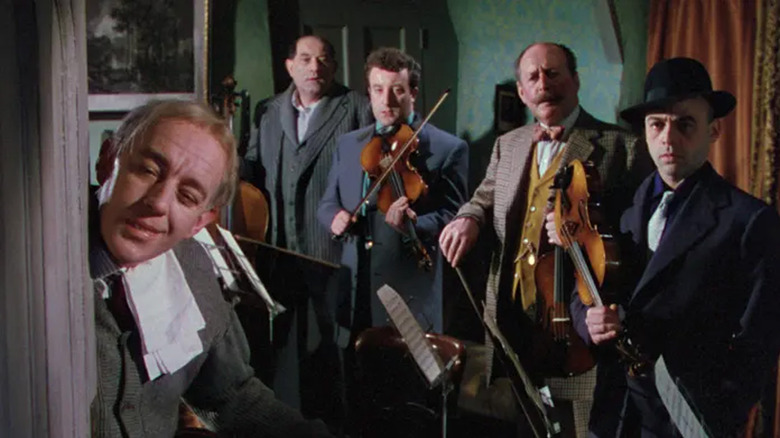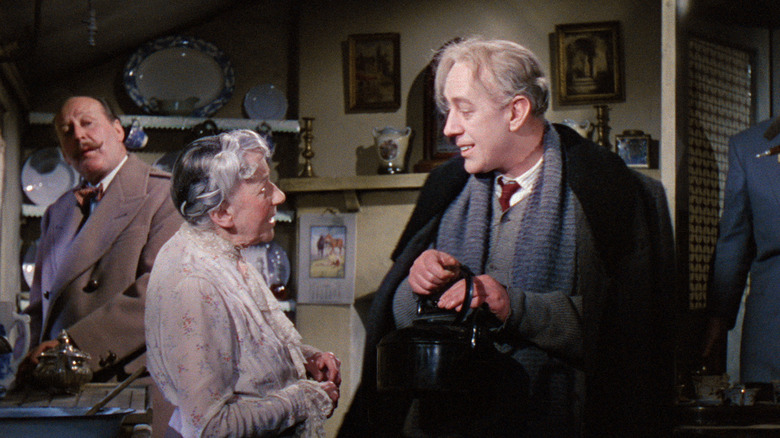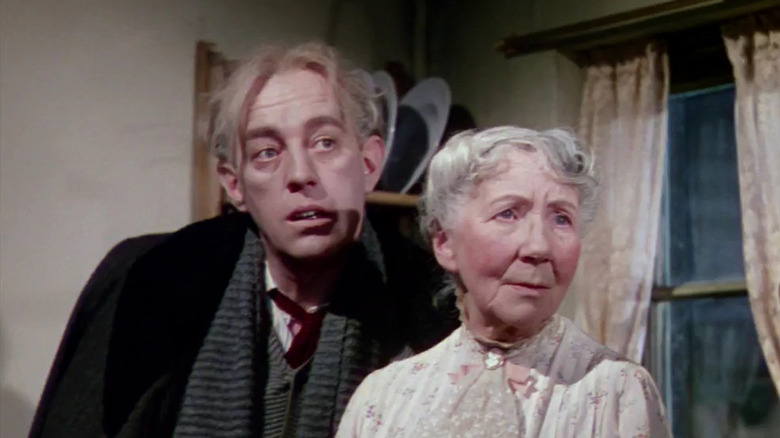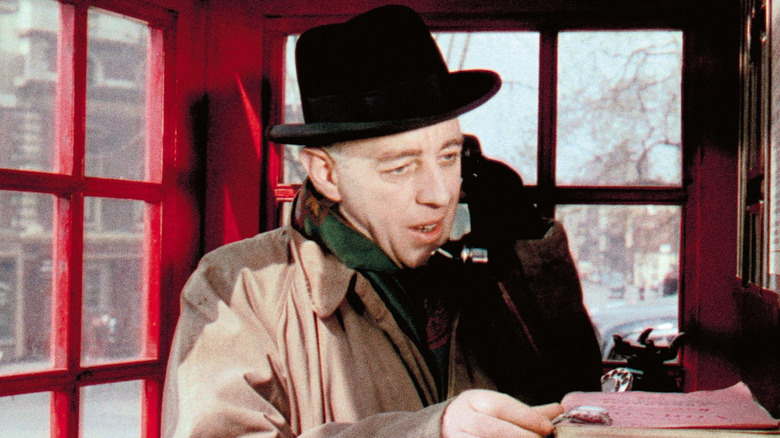The Ladykillers Could Have Been The End For Alec Guinness
We may receive a commission on purchases made from links.
Ealing's classic 1955 film "The Ladykillers" is often considered one of the greatest comedies of all time. It's also the last remnant of post-war London in a world that was moving on — rationing, steam trains, and carthorses firmly anchor the film to its post-war setting. "The Ladykillers" is a product of its time, but also the perfect comedy vehicle for Sir Alec Guinness.
Guinness (who was a legendary actor for decades before playing Obi-Wan Kenobi in "Star Wars") plays the grotesquely sinister Professor Marcus, a criminal mastermind who puts together a gang of hardened criminals to pull off a sophisticated security van robbery at London King's Cross station. The catch? They've rented a room with the meddling Mrs. Wilberforce (Katie Johnson) to plan their heist ... all under the guise that they're a string quartet that needs a space to practice. But as she catches on to what they're up to, the gang decides it's time for Mrs. W to kick the bucket. It's a rightfully famous role that sees Guinness team up with the legendary Peter Sellers for a timeless comedy caper that will leave even modern audiences belly-laughing.
But while it was just the beginning for the great Sir Alec Guinness in his flourishing big-screen career, it was also very nearly the end.
A series of unfortunate events
The final scenes of "The Ladykillers" give each member of the gang the perfect comeuppance — none more than Professor Marcus.
After the gang decides to murder Mrs. Wilberforce to keep her quiet, they draw straws to decide which one of them will do the despicable deed. But things start to fall apart as they realize that none of them wants to go through with it... and they're willing to cross and double-cross each other to get away with the perfect crime.
The Major (Cecil Parker) loses the draw but decides to make a run for it with the money before the others notice. Unfortunately, he's caught out and falls off the roof to his death after being chased by Louis (Herbert Lom). Next, One-Round (Danny Green) is tasked with the dastardly deed but has a change of heart. He can't go through will killing poor Mrs. Wilberforce, but the former boxer thinks Harry (Peter Sellers) has already got there first and kills him instead. Things go from bad to worse when One-Round hears Louis and Marcus talking about double crossing him. But when he tries to shoot them, it turns out the safety is on, giving Louis the chance to finish him off first. Finally, Marcus ties up all the loose ends by killing Louis — causing him to plummet to his death by knocking a ladder out from under him.
As each of them dies in quick succession, their bodies end up dumped into the trailers of passing good trains until only one crook remains — Professor Marcus.
Don't worry, he won't be sticking around for long. But Professor Marcus' swansong was almost a very final scene for Sir Alec Guinness, too.
An ironic final scene almost killed him
That's right — Alec Guinness almost suffered the same fate as Professor Marcus.
As Louis plunges to his death, he fires one final shot at Professor Marcus ... a near miss. But while Marcus is now the last man standing, he hasn't outrun his destiny. A changing railway signal falls from overhead, striking Marcus and killing him. His body plunges into another passing goods train and that's the last we see of Marcus and his gang.
But Sir Alec Guinness also suffered a near miss while filming this scene.
Piers Paul Reid wrote Alec Guinness: The Authorised Biography, and explained in detail what happened on that nearly fatal day:
"When Alec, as the Professor, is killed by a railway signal falling onto his head, the production crew made sure that this would not in fact happen by placing a metal pin half an inch above the level of Alec's head. Lines were drawn in chalk to mark where he should stand for the shot. When it came to the take, however, the signal sheared the metal pin and tore the back of Alec's jacket. He had been standing an inch or two in front of the chalk mark — a mistake that saved his life."
If Guinness had been standing directly on his mark, he would have suffered the exact same fate as poor Professor Marcus. But this wasn't the first time Sir Alec Guinness had a brush with death while filming.
Alec Guinness had a few near misses
Thankfully, Guinness survived his on-set accident while filming "The Ladykillers" and escaped with little more than a torn jacket. But while some think that the actor made a mistake by not standing on his mark, I can't help wondering if it was caution that saved his life.
One of his first films, "Kind Hearts and Coronets," saw the crew make several mistakes that also could have cost Alec Guinness his life. During one scene, he was tethered to the bottom of a water tank so a shot could be filmed of rising water overcoming him as his Admiral character went down with his ship. "[The director] wanted the camera to linger on the swirling water long enough to show the Admiral's cap floating away," explained Reid.
Alec Guinness claimed he could hold his breath for up to four minutes — a useful skill that would allow the crew plenty of time to get their shot. But things went awry. As Reid wrote:
"The scene was duly shot at the end of a long day and, considering it satisfactory, the members of the production team began packing up their equipment and preparing to go home. Only well into the four minutes was it remembered that Alex was still tethered underwater and one of the crew had to dive into the tank with wire cutters to set him free."
Similarly, a production error on "The Man in the White Suit" almost led to grave consequences. Required to be suspended by a wire for one scene, Guinness insisted it was likely to snap — he was familiar with the equipment from his time in the navy. Reid, again:
"When he pointed this out to technicians, they laughed and told him to mind his own business. Sure enough, the wire snapped and it was only good luck that saved him from death or serious injury."
Thankfully, he walked away from both of these near misses, only to find himself almost finished off on the set of "The Ladykillers" just a few years later. Still, it sounds as though Sir Alec Guinness was remarkably lucky. And our favorite Jedi master lived to fight another day.



